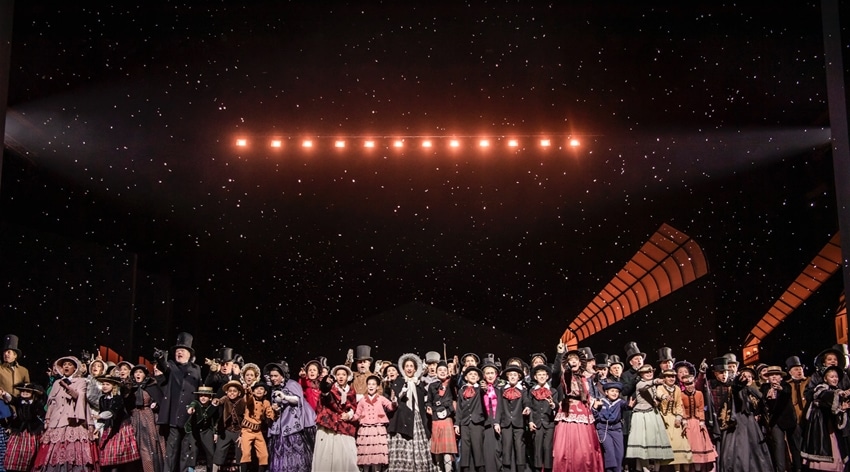Alastair Macaulay: Two Bohèmes in London come up totally fresh
News
Alastair Macaulay reviews Covent Garden’s revival of Richard Jones’s Bohème, exclusively for Slipped Disc. It’s coming to cinemas worldwide next week.
Richard Jones’s Royal Opera production of Puccini’s La Bohème, new in 2017, goes all against the grain of this opera’s tradition. Rather than immediately immerse the audience in the illusion of a seemingly real world, it keeps telling viewers “This is just theatre.” The Paris attic that’s the home of the opera’s four impoverished male artists, lacking any realism, looks unlived-in. Rodolfo and Mimì converse about being unable to see when actually they’re in bright light. The outdoor scenes of Acts Two and Three feature constructions that move while we watch.
Yet this really is theatre – we find we do believe in this world. The four male artists, the two women who enter their world as lovers, and the many other Parisians they encounter all interact in enchanting ensemble.
This feat is most remarkably achieved by the unalike two men who start the first and fourth acts: the Peruvian tenor Juan Diego Flórez as Rodolfo and the Moldavan baritone Andrei Zhilokhovsky. Flórez’s voice is bright but small, Zhilikhovsky’s is dark and big. Thanks to the conducting of Kevin John Edusei and the revival direction of Danielle Urbas, Flórez and Zhilikhovsky combine in trust like old friends. Flórez, who came to international fame as a bel canto star in the comedies of Rossini and Donizetti, sings even small Puccini phrases (“Buona sera”, “In verità”) with tender portamenti that make them eloquent from within, like caresses. Zhilikhovsky can fine his large voice down to a thread.
The whole revival is like that. Every soloist has his or her memorable moments, within an intensely theatrical stage world of pulsating vitality. The American soprano Ailyn Pérez, as Mimì, seems all heart in her marvellous combination of vocal bloom and poignancy. (She wasn’t relaxed in every phrase in this performance- I’ve heard her sing this role and others at the New York Met with more consistent beauty – and yet there were many lines I heard as of for the first time: such as “Che mi parli di perdono?”, – “Why do you talk to me of forgiveness?”) Danielle de Niese plays Musetta with soubrette vivacity laced with touches of witty acidity; she relishes – as does the audience – the production’s most outrageous stage business. (While singing the famous waltz song, she removes her knickers beneath her long skirts and throws them at Marcello, who savours them like old friends.)
All of them have vividly speaking body language, often like shared jokes. When Rodolfo/Flórez tells Pérez/Mimi of his millionaire uncle, his legs take on a dancing totter. Even when Mimì is dying and he finds her old bonnet, he puts it on his own head: you know in a moment that they loved to laugh together.
Zhilikhovsky, making his Royal Opera debut, may prove an invaluable artist. Amid a cast of highly three-dimensional interpretations, his Marcello is the most rounded of all, now extrovert and forceful, now furtive and private. The British baritone Ross Ramgobin’s Schaunard is the most flamboyant of the attic men – but the most touchingly gauche in the face of Mimì’s final illness. The Scottish bass Michael Mofidian Colline, the most sensitive observer of the quartet, sings with touching firmness.
Like the contrasting voices of this Rodolfo and this Marcello, all the elements of this Bohème add this old warhorse up into an entirely fresh amalgam. Earlier this year, the very different, more realistically detailed, the Jonathan Miller Bohème at English National Opera was revived to similar vivid effect. There are reasons why post-pandemic (and post-Kwarteng) audiences aren’t rushing to fill these theatres (Covent Garden’s Bohème prices climb to £235), but onstage London’s two opera companies are keeping central repertory fresh and young.
Alastair Macaulay






Comments